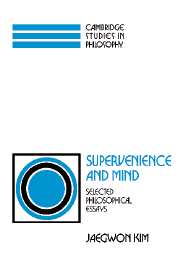Book contents
- Frontmatter
- Contents
- Preface
- Sources
- Part I Events and supervenience
- Part II Mind and mental causation
- 10 Psychophysical supervenience
- 11 Psychophysical laws
- 12 What is “naturalized epistemology”?
- 13 Mechanism, purpose, and explanatory exclusion
- 14 The myth of nonreductive materialism
- 15 Dretske on how reasons explain behavior
- 16 Multiple realization and the metaphysics of reduction
- 17 The nonreductivist's troubles with mental causation
- 18 Postscripts on mental causation
- Index
11 - Psychophysical laws
Published online by Cambridge University Press: 28 January 2010
- Frontmatter
- Contents
- Preface
- Sources
- Part I Events and supervenience
- Part II Mind and mental causation
- 10 Psychophysical supervenience
- 11 Psychophysical laws
- 12 What is “naturalized epistemology”?
- 13 Mechanism, purpose, and explanatory exclusion
- 14 The myth of nonreductive materialism
- 15 Dretske on how reasons explain behavior
- 16 Multiple realization and the metaphysics of reduction
- 17 The nonreductivist's troubles with mental causation
- 18 Postscripts on mental causation
- Index
Summary
The question whether there are, or can be, psychological laws is one of considerable interest. If it can be shown that there can be no such laws, a nomothetic science of psychology will have been shown to be impossible. The qualifier ‘nomothetic’ is redundant: science is supposed to be nomothetic. Discovery, or at least pursuit, of laws is thought to be constitutive of the very nature of science so that where there are no laws there can be no science, and where we have reason to believe there are none we have no business pretending to be doing science.
At least in one clear sense, therefore, the absence of psychological laws entails the impossibility of psychology as a science. This need not be taken to mean that there can be no scientists, called ‘psychologists’ or ‘cognitive scientists’, who study psychological topics and write useful tracts about them. It is to say that whatever else they may be doing that is useful and worthwhile, they will not be producing psychological theories, comprehensive and integrated systems of precise general laws, couched in a characteristic theoretical vocabulary, on the basis of which mental phenomena could be explained and predicted. If such theory-based explanatory and predictive activities are what we suppose psychologists qua psychologists to be engaged in, recognition of the impossibility of psychological laws would force us to reconsider the nature of psychology as an intellectual enterprise.
- Type
- Chapter
- Information
- Supervenience and MindSelected Philosophical Essays, pp. 194 - 215Publisher: Cambridge University PressPrint publication year: 1993
- 3
- Cited by



